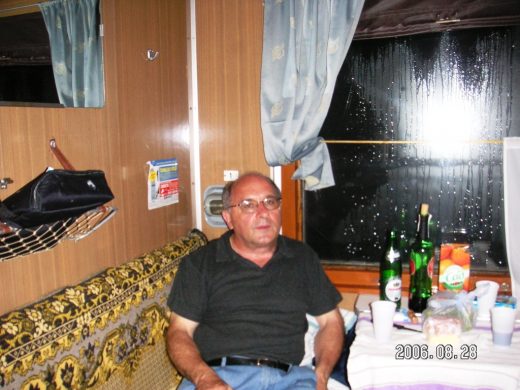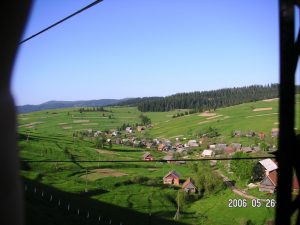
(This was taken on a train from Kyiv to Uzhgorod a frequent trip for me. While it was a 17 hour journey it was always fun and often insightful as you met many people.)
Saturday the 14th was the beginning of my third month in Ukraine. As I write this it is once again on an overnight train returning me to Uzhgorod, my current home. This has become the norm for me as I continue to make a fit within this community development process and lend support to the various and distant communities that have become a part of it.
My arrival here in March was fortuitous as I have been able to watch the land come alive as spring has unfolded in different regions at different times. Kiev and the area to the south, from where I am returning, are still in bloom while in Uzhgorod the blossoms are mostly past because of its more temperate climate.

The lush mountains of Trans Carpathia, the rolling fields just beyond and the prairie like terrain of central Ukraine have each taken on a different garment. Gone is the gray drabness that was winter’s end and now the greenness shows its splendour and hides much of the waste that has become part of the landscape as people try and dispose of the seemingly endless array of plastic products that have become part of their lives. The beauty of the countryside is most impressive and the old and ancient buildings and monuments add to the colour and mystique.
Traveling through the countryside and visiting communities one is able to view the seemingly endless array of empty and rusting factory and large mostly derelict farm buildings, the street lighting that is no longer operational and the rubbish heaps that seem to be everywhere. These are the remnants of broken systems of economy and of local services that people are struggling to renew. One recognizes that perhaps twenty or more years ago when these factories and collective farms were in production and community infrastructure was working that people must have felt they lived in prosperous times. Everyone was apparently employed, people were busy going about their daily chores and local services were available even though they had to endure the repressive environment under which they lived.
Certainly a lot to comprehend and understand in a few short weeks as I try to assist people take a different view. My learning continues as I struggle to complete the picture in my mind – the image of these huge factories, fully operating municipal services with very significant community infrastructure and buildings and the local routine that people had as they worked in these large factories and large farming operations. Then to trace the evolution of decline to what one sees today with these huge rusting hulks, little by way of municipal services (not even waste removal in many places and streets and sidewalks crumbling) and people selling produce and goods wherever they can find a niche in a marketplace or along the streets and highways. Many people are selling similar things in relatively the same places, each vying to make enough to keep life going.
It makes me think of the vulnerability of our own system as I hear in the current business news, the reports of government dysfunctionality and the endless articles outlining the rising debt loads that are carried even by individuals. Then there are the macro economic shifts that are apparent on the global economic scene. What I have seen and experienced since I arrived has many similarities to other areas that I have worked and lived as manufacturing has closed, resource industries have declined, and fisheries have collapsed. Agricultural has followed a similar pattern but has maintained some of its existence at the expense of the smaller operations and by dint of very heavy subsidies which will at some point reach an apex if not already. Full collapse of communities, has been averted by government support but as the list continues to grow and the costs increase the question of the sustainability of this approach has to be addressed.
I keep thinking what will happen in Canada as the auto industry internationally realigns. Such a collapse would force the Canadian government to shift more of its resources to Ontario further exposing the economic vulnerabilities in the remainder of the country heightening the tensions among provinces and people. What will happen as the debt burdens that people are incurring reaches its crisis point and the real estate market shrinks as a result and people find themselves in a situation that hasn’t been seen since the thirties? We are told it can’t happen, but then we are told lots of things that become untrue over time and I am sure it won’t take much reflection to name a few. I say none of this as a doomsayer as it is not a part of my makeup or belief, but only as reflection in light of what people who are now disadvantaged are facing after having similar “economic security”.
But, I am sure that such suggestions will be countered with a response that in the west we have a different system. It will be argued that democracy and capitalism are flexible and adaptable enough to allow positive evolution to occur. What I am learning in my short time here and from my other experiences in communities that systems are only as flexible and malleable as the people within them. Rigid thinking and mindsets influence the systems that have been created. This rigidness and intransigence is where the corrosion starts and the break down begins.
I see the rigidity of thought and mindset here as local groups attempt to push the limits of what could be. There is, among many, a belief that life, society, law and governance operate in a field of colour that ends at black and white. For many there is little room for experimentation, innovation or flexibility. For some their interpretation of democracy is as a rigid construct where people and government are separate and not a harmonious relationship between people and those they choose to be their leaders that true democracy must be. Some of these attitudes are perhaps historical but also a partial means to protect the advances that they have made over the past decade or so.
I witness similar rigidity growing in Canada. The resistance to change for fear of what the change might bring, even though the changes are already happening. It’s apparent in the current political situation. The Liberals remain in power despite their obvious dysfunctionality and corruptness only because people fear the Conservatives if elected. The demise of health care, diminishment of social services and the imbalance in economic well being are happening even without a more “conservative” agenda. Few politicians are honest enough to espouse the fact that the way our system and its services are currently structured is not sustainable. Almost everyone recognizes this but apparently there are few willing to address this issue because there is no simple answer to its solution.
A genuine process is required where government and people come together to reconstruct what is currently unrepairable. That doesn’t mean that the values that created the current system have to be lost. Instead the discussion continues as to weather the system is truly broken, while financial band aids, ever larger ones, are applied to keep it running. The process of renewal is continuously set aside.
So I traverse Ukraine and reflect how people in many parts of Canada would react if there were no funds for basic local services, if garbage was not collected, streets not lit and snow removal became virtually impossible. I only have to think for a moment to similar occurrences during local strikes, work stoppages and other happenings that have closed public services for a short time for an answer.
The more positive aspects of what I am viewing are the shifts taking place within Ukraine, and remember that my learning curve is still vertical after just two months. In larger centres construction abounds, new businesses are appearing, sidewalk sellers have found stalls and stall holders have moved into more adequate premises. Communities are finding ways to collect and dispose of their garbage, innovative means to relight streets and provide other basic services. Others are learning from these pioneering spirits. It is a slow tedious process and a re-education for people. I believe that this regeneration process might be expedited with development processes based on more human approaches to learning instead of simply the transferal of finance, systems and programs. Many of these approaches are flawed where they are used currently. I fear that the message coming from many outside organizations (especially the large international development and monitoring agencies) who suggest that Ukrainian adopt a western type system and all will be well. Few of the systems in the western world appear healthy.
People have the ability and the inner strength to withstand change – even the most dire – and there are certainly many examples in this part of the of the world with its wars and their fallout over the past 100 years. What people currently need more than anything else is understanding and support and the “necessary” and long term resources to make the shifts that they know they have to make themselves. Achieving this balance in support and the resources is still the main challenge.
And what of Canada and its impending challenges? I believe and have for many years that the same process is required there. People need an educational process that affords them the understanding of the precarious nature of their system and the dangers of the rigidity which has been adopted to maintain it. The system needs re-inventing. That is the real challenge. In an evolving world others are not only demanding a greater share of prosperity, they are now extracting it through their own education, know how and ingenuity. The balance has forever shifted. People need understand this most of all.
The evidence is here in Eastern Europe as people to struggle to re-invent their system but only after it collapsed. The shift from communist control to little control didn’t happen over night, it took a long time. There have been many setbacks and building a democratic form of government won’t happen instantaneously. But it will happen because there is a will and desire for something different. That is one constant of human nature. But this new system will only last as long as it takes people to become too comfortable, rigid in their thinking and complacent to the idle and often corrupt activities of their elites. The history books are full of examples.
Who will lead this educational process? It certainly won’t be the entities that have vested interests in maintaining the status quo – even if they know its unsustainable. It won’t be the politicos, the business elites or even most of the not-for- profit sector. They all appear very comfortable with things the way they are.
What is required is a movement of people. Community movements always emerge in times of crisis or fundamental change. There is a critical mass of mostly young and some older disenfranchised and disenchanted people. They are connecting and emerging and continually being foiled by force or economic means. They have mounted protest and rebellions. They have been captured by those who espouse social leadership, repelled by the political leaders and harassed by the business leaders. This movement, in time, must find its own feet, develop and trust its own leadership and takes its own direction, while rejecting that espoused by the great and the good and others who would influence or hinder them. Then perhaps we will have the fundamental change that is required.
Written by Bill Pardy
May 24, 2005


